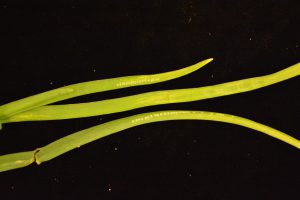Allium Leaf Miner
Allium leaf miner (ALM) feeding/egglaying scars were detected in chives near Princeton (Mercer Co.), NJ on Tuesday of this week. This indicates that the first (spring) flight of these flies has now begun and damage will increase. Additionally, extension personnel at Penn State have reported finding the first feeding scars in several southeastern PA sites within the past few days. It is believed that all of these occurrences are very recent.
Growers should consider initiating the control method of their choice at this time. Affected crops include chives, scallions, garlic, onions and leeks.
Floating row covers, kept on until this flight ends will help minimize access to plants. Insecticide applications targeting adults may be helpful as well, although frequency of applications is uncertain. Spinosyn materials (Radiant, Entrust (OMRI approved)), pyrethroids (Mustang Maxx, Warrior), neonicotinoids (Scorpion, Venom) and the insect growth regulator Trigard are labeled for miner control.
Adult activity and observations of feeding will be reported on in the IPM Update as they occur. At this time, all growers should respond to the first adult generation. We will attempt to identify the end of the first flight so that growers know when the risk of infestation has abated.

